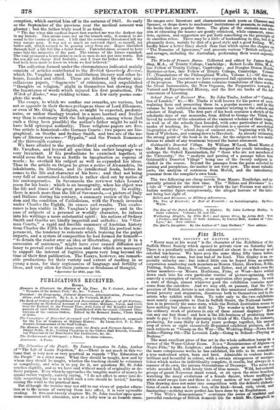PUBLICATIONS RECEITED.
BOOKS.
Memoirs to Illustrate the History of My Time. By F. Gnizot, Author of " Memoirs JA Sir Robert Peel," Ac, Sic. Volume L Trinidad : its .Geography, .hratural Besotirce4, Administration, Present Con- dition, and Prospects. By L. A. A. De Verteuil, M.D.P.
The Book of 'Orders of Knighthood and Decorations of Honour of All Nations ; comprising an Historical Account of each Order, Military, Naval, and Civil, from the Earliest to the Present Time, with Lists of the linights and Com- panions of each British Order. Embellished with fac-simile coloured Illus- trations of the various Ostlers. Edited by Sir Bernard Burke, 'Ulster Ring of Arms.
The Campaigns of Hannibal Arranged and Critically Considered, expressly for the Use of Students of Military History. By Lieut.-Col. P. L. Mac- dougall, Commandant of the Staff College.
The Human Mind in its Belations with the Brain and Nervous System. By Daniel Noble, M.D., Visiting Physician to the Clifton Hall Retreat, Consult- ing Physician to the Manchester Ear Institution. Re. Sae.
The Netherwoods of Otterpool : a Novel. In three volumes. Anastasia. A Poem.
The Education of the People. By James Augustus St. John, Author of" The Life of Louis Napoleon,' &c.—There is not much in this vo- lume that is very new or very practical as -regards "The Education of the People" in a strict sense. What they should be taught, how and by whom they should be taught, whether the teaching should be voluntary or compulsory, and who is to pay for it, are questions Mr. St. -John touches slightly, and as we have said without much of originality or de- finite purpose. Even when he approaches the tangible matter of money he speaks rather vaguely, naively saying, "I do not affect to enter into de- tails respecting the way in which such a rate should be levied," leaving raising the wind to the practical men. But although the treatise may not add to our -views of popular educa- tion or to the moans of carrying them into effect, it is very agreeable reading. In five-and-twenty chapters Mr. St. John touches upon ques- tions connected with education, now in a lofty now in an humble sense. He ranges over literature and characterizes such poets as Chaucer and Spenser, or drops down to mechanics' institutions or peasants, to indicatk the books that are popular there. The plans of the eminent men who aim at -educating the masses are gently criticized, while comment, mac. dote, opinion, and suggestion are put forth something on the principle of de omnibus rebus. There may be a little of bookmaking in this, but it is pleasantly done, mainly by dint of a good style imd a good feeling. Npa hardly know a better fancy sketch than that which opens the chapter on "The Domains of Ignorance," and presents various "British subjects', and savages, including the Australian, performing their worst sepernti. lions.
The Works of Francis Bacon. Collected and edited by James Sped. ding, M.A., of Trinity College, Cambridge ; Robert Leslie Ellis, 1,14, late Fellow of Trinity College, Cambridge ; and Douglas Denon Heath, Barrister-at-law, late Fellow of Trinity College, Cambridge. Volume IV. (Translations of the Philosophical WOrks, Volume L)—Of this ca. dertaking and its execution we have expressed full opinions in the cow, of its progress. The present volume contains translations of three works, the Great Instauration, the New Organon, the Preparative towards a Nat-Ural and Experimental History, and the first six books of the Ad. vancement of Learning.
School Days of Eminent Hen. By John Timbs, Author of" Curiosi- ties of London," &c.—Mr. Timbs is well known for his power of acre.mulating fact; and presenting them in a popular manner ; and in this volume he has collected an immense number relating to the schools and scholars of England. The first part of his book contains a sketch of the scholastic days of our monarchs, from Alfred to George the Third, re. lieved by notices of the education of the eminent scholars of their reigns, as -well as of the schools then founded, with some particulars of books, modes of teaching, he. The second division is a species of aueedotieal biographies of the "school days of eminent men," beginning with Wit. liam of Wykeham, and coming down to Havelock. As already intimated, the strong point of the book is its facts ; for the subjects are too multi- farious to admit of any treatment beyond the barest statement.
Goldsmith's Deserted Tillage. By William M‘Leod, Head Master of the Model School, he. &c.—Primarily designed for youth intending to undergo the Oxford Examination, for "those who are not members of the University," the " analysis and parsing of a passage taken from Goldsmith's Destcd Village" being one of the twenty subjects in. chided in the course. Beyond the passages from the poem selected for parsing and paraphrase, the matter is not very new. The most Valuable parts, the analysis of sentences from Moron, and the introductory grammar from the compiler's own book.
The two following are cheap novels from Messrs. Routledge, and ap- parently printed for the first time. The "Billets and Bivouacs" is a a tale of "military adventures" in which the lat‘' Persian war and the Indian mutiny figure conspicuously, the alleged horrors of the latter not being lost sight of.
Billets and Bivouacs ; or Military Adventures.
The Ties of Kindred; or Best at Eventide : an Autobiography. By Outs Wynn.
The Rise of the Dutch Republic. A History. By John Lothnap Motley. la three volumes. Volumes II. and HI.
Wuthering Heights, by Ellis Bell ; and Agnes 'Grey, by Acton Bell. With a Preface, and Memoir of both Authors, by Currer Bell, Author of "Jam Eyre," Sm. New edition.
The Earl's Daughter. By the Author of" Amy ilechort." New edition.


































 Previous page
Previous page